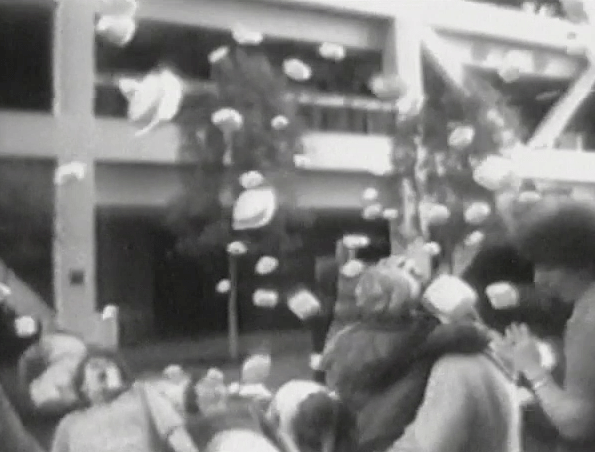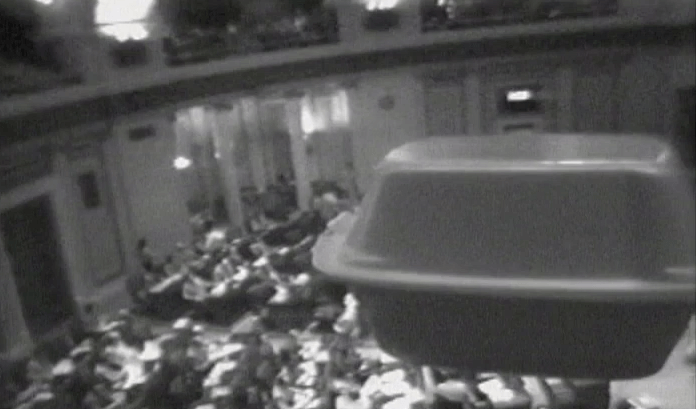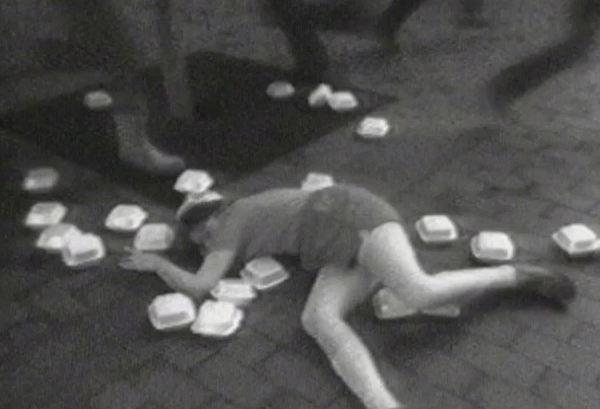Attack of the Burger Pods!
Veteran Indie video artist reflects the making of a MN 70s cult classic
Timid Video Theater's Attack of the Burger Pods was launched on the cabaret and saloon circuit at Dudley Riggs ETC. Theater in October 1979 and on broadcast television courtesy of KTCA-TV's celebrated arts magazine Wyld Ryce on December 5th. The sci-fi spoof (it comes with whimsically framed environmental warnings about fast food, plastic Big Mac cartons and pop-culture) also played the Commodore Hotel and Richard's Piano Bar in the Twin Cities and Don't Tell Mama and Jan Wallman's cabarets in New York where WNEW-TV's legendary theater critic Stewart Kline gave Pods one of his 'must see' recommendations. For years Pods producer Jeff Strate has claimed that the very same muse that had inspired the famously inept film maker Ed Wood in the 1950s was smiling at Timid Video in the 1970s.

'Portapak' Production
Attack of the Burger Pods was produced using portapak video cameras and decks and half inch, reel-to-reel video tape editing machines at University Community Video. UCV's pioneering video production access facility was free. A Jerome Foundation grant and ticket sales from saloon showings of earlier Timid Video comedies such as "Bowling for Tenure," "The Bionic Governor," and "The Taste Commandos" and donated props, sets and countless hours contributed by scores of professional and community theater actors and production techies made the half hour lark possible. Humorist Allen Brookins-Brown, student Marji Moos, actor Pat Bettendorf and KUOM Radio news director David Lee Olson and a large cast of bit players and extras were directed by Tom Braun and Strate. Brave New Workshop performer Jay Reilly appears in and co-directed the infamous mass panic and lonely-guy-at-bar/end-of-world scenes. Singer-composers Vicky Mountain ("Pod Rock") and George Bigelow ("With a Little Understanding"), theremin player Arby Schuman and audio aces John Struthers, R. Jeff Smith and Stu Sanders contributed original music, atmospheric sound effects and mixes.



TPT Opens up its airwaves
The Twin Cities of the late 1970s was exploding with community, campus and professional theater. Civil, voter and women's rights and the anti Viet Nam War movements showed that regular folks did have power and create change. Black neighborhoods in Detroit, Newark and Watts were still burning (if only metaphorically) and Earth Day was then a big, annual event. During the peak of singer Tony Orlando's, Governor Wendy Anderson's and CBS News anchor Walter Cronkite's influence, Twin Citians had only five major UHF stations to stare at. Twin Cities Public Television - KTCA-TV - was liberating itself from the gravitas of chalk board news analysis, puppet shows, action auctions and pledge drives. Even as it continued to embrace (far too affectionately) BBC programming, KTCA began wonderfully responding to the vibrant 1970s blooming of local arts, music and theater with cultural specials and Wyld Ryce. Twin Cities Public Television eventually found merit in providing University Community Video air time for what became the nation's first, regularly scheduled, grassroots, TV series, Changing Channels. Timid Video Theater and other alternative, "guerrilla" video producers got their documentaries, folk concerts, video art and minority voices on Channels 2 and 17 – on the same channels as Monty Python's Flying Circus, Masterpiece Theater and Nova. "We video freaks at UCV," says Strate, "sensed we were an extension of the movements of the '60s and '70s - in a mild Minnesota kind of way - and by luck could do programs with the first generation of affordable and portable cameras and recorders.
Inspired by Monty Python... and a cognac
One winter night in the Commodore Hotel's Mirror Bar after a Python show, Strate tossed back an honorable cognac, reflected some on John Cleese and Terry Jones in the company of a few friends and then said, "We can do that." Timid Video Theater still produces the occasional comedy video. Its biggest digital age hit is "Godzilla Attacks Eden Prairie." Timid also works with humorists Mike Gelfand, Jon Spayde and the Junk Yard Democrats on segments for Democratic Visions. The monthly, also produced by Strate, is distributed to select local cable systems and has its own YouTube channel. Democratic Visions is handcrafted by volunteers through Southwest Community Television; like long gone University Community Video, SWTV ia a community/public access service.
This story is made possible by the Arts and Cultural Heritage Fund and the citizens of Minnesota.
